This article contains an overview of IPFD's first Virtual Health Meeting's Pre-Meeting information.
The meeting was online held on September 28, 2021.
Theme: Standardizing Genetic Testing
 Donate
DonateDid you find our content interesting or helpful? Help support the IPFD enhance health, well-being and welfare for dogs everywhere.
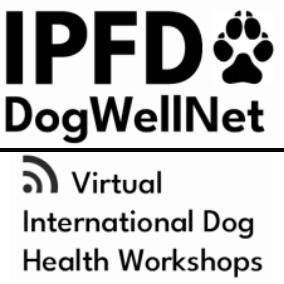
This article contains an overview of IPFD's first Virtual Health Meeting's Pre-Meeting information.
The meeting was online held on September 28, 2021.
Genetic test providers, breed-health advisors, kennel clubs, and researchers developing new genetic tests
From Information and Collaboration to Action!
The aim of the workshop is to discuss and share relevant information around these challenges, and others, relevant to standardizing genetic reports. By doing so, we can identify outcomes and agree actions towards improving genetic reports, ultimately to the benefit of dog health and welfare.
Within the topic of Standardizing Genetic Reports, four challenges for discussion have been identified as being key to improving genetic reports:
For each challenge, we have a speaker who has kindly agreed to provide their experience and expertise in a pre-meeting presentation. They will also participate in the session on 28 September.
Confirmed presenters include Dr. Cathryn Mellersh (University of Cambridge), Dr. Jonas Donner (Wisdom Panel), Dr. Joanna Ilska (The Kennel Club), Dr. Danika Bannasch (University of California, Davis), Dr. Adam Boyko (Embark), and Aimée Llewellyn-Zaidi (IPFD).
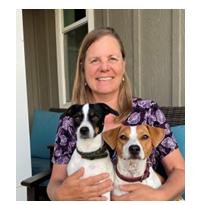 Dr. Danika Bannasch
Dr. Danika Bannasch
Professor in the Department of Population Health and Reproduction in the School of Veterinary Medicine, University of California-Davis
Dr. Bannasch earned her DVM degree from the UC Davis School of Veterinary Medicine and her PhD degree in mouse molecular genetics at Princeton University. She is currently a Professor in the Department of Population Health and Reproduction in the School of Veterinary Medicine, University of California-Davis and is the first faculty member to hold the prestigious Maxine Adler Endowed Chair in Genetics.
An accomplished veterinary geneticist, Danika Bannasch DVM PhD focuses her research on the identification of the molecular causes of inherited diseases in dogs and horses. Her laboratory has identified the DNA changes responsible for Lethal White Foal Syndrome, Hereditary Equine Regional Dermal Asthenia, Hyperuricosuria, Alaskan Husky Encephalopathy, Cleft palate, Cleft lip and palate, Spinal Dysraphism, Glioma susceptibility, chondrodystrophy, Neuroaxonal dystrophy, MPS Type I, screw tail and Saluki Spongiosis. Important research findings have also led to animal models used for similar human diseases. By studying naturally occurring diseases in animals, the Bannasch Laboratory is discovering a triad of significant advances: the development of diagnostic tests to aid animal breeders; the identification of novel genes and pathways as candidates for human disease; and an understanding of basic molecular mechanisms of disease.
 Dr. Adam Boyko
Dr. Adam Boyko
Chief Science Officer and Founder, Embarkvet
Adam is an associate professor in Biomedical Sciences at Cornell University College of Veterinary Medicine, focused on the genomic investigation of dogs. His research has addressed fundamental questions of dog evolution and history, disease and trait mapping, and advancing genomic tools for canine research.
Adam has co-authored over 40 peer-reviewed scientific papers, including research in Nature, Science, and the proceedings of the National Academy of Science. He is a graduate of the University of Illinois, Urbana-Champaign and received an MS in Computer Science along with a PhD in Biology from Purdue University before completing his postdoctoral work at Cornell and Stanford.
 Dr. Jonas Donner
Dr. Jonas Donner
Wisdom Panel
Since receiving his doctorate in 2012, Jonas has worked at the forefront of canine genetic testing—shaping the future of personalized pet care and veterinary medicine through state-of-the-art genetic tests. Inspired by the Finnish tradition of studying disease in isolated populations, his research interests include exploring the distribution and prevalence of inherited diseases and traits in dogs and cats across breeds. Jonas also belongs to the dog breeder community, as he and his wife actively breed Shetland Sheepdogs.
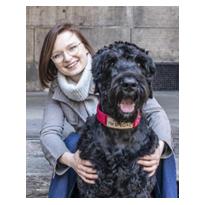 Dr. Joanna Ilska
Dr. Joanna Ilska
Genetics Research Manager at The Kennel Club (UK)
Joanna has always been interested in animals and more specifically, the power, complexity and ethics of breeding animals to suit human needs. This has led to her completing her first degree in BSc Applied Biosciences (Animal Science) in 2008, followed by an MSc in Quantitative Genetics and Genome Analysis at the University of Edinburgh in 2009. In 2014 she completed her PhD in Genomic Prediction of Breeding Values in Broiler Chickens at the Roslin Institute, University of Edinburgh.
Following her PhD, she worked as a Research Fellow on a number of projects in a wide range of species, before joining The Kennel Club in 2021.
Her main expertise lies in prediction of breeding values for complex traits, using large scale genomic data such as whole genome sequences. In private life, Joanna is a “dog person”, keenly involved in dog training and dog sports with her Russian Black Terrier, Falka.
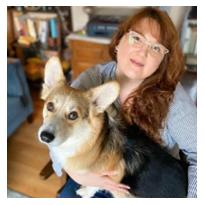 Aimée Llewellyn-Zaidi
Aimée Llewellyn-Zaidi
IPFD HGTD Project Manager, USA
Aimee is responsible for maintaining the quality and completeness of data in the Harmonization of Genetic Testing for Dogs (HGTD) database. This includes updating the generic phenes (test) information. Aimee coordinates the Breed Relevance Rating and is close communication with our Collaborating Experts.
In addition, Aimee fields queries from our DogWellNet.com members and breeders on issues related to genetics and genetic counselling.
Formerly Head of Health and Research at the Kennel Club, Aimee provided bespoke advice to Kennel Club clients, and developed evidence-based canine health resources and engagement programmes for the public and professional.Aimee's experience at the Kennel Club included: development of the Health Team, active engagement and involvement with committees of the Kennel Club and British Veterinary Association (Canine Health Schemes); direct collaboration with international universities, and the Kennel Club Genetics Centre at the Animal Health Trust, and engagement with exciting external projects such as Vet Compass (RVC), and as a speaker at BSAVA Congress, as well as numerous publications and media engagements. Aimee was also involved in the initial development of the journal “Canine Genetics and Epidemiology,” and remains active as an editorial board member. When not working on Harmonization of Genetic Testing for Dogs, Aimee spends her time walking her Pembroke Corgi, McDuff.
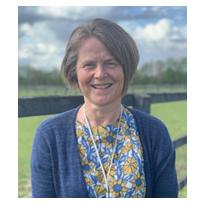 Dr. Cathryn Mellersh
Dr. Cathryn Mellersh
Department of Veterinary Medicine, University of Cambridge
Cathryn completed a BSc in genetics at the University of Newcastle upon Tyne in 1984, followed by a PhD in developmental genetics from the University of Leicester in 1991. She stayed in Leicester for her first post-doctoral position during which she identified some of the first canine genetic markers. Her next role was at the Fred Hutchinson Cancer Research Center, (Seattle, USA), in Elaine Ostrander’s laboratory, where she played an integral role developing the first maps of the canine genome.
Cathryn took up her position at the Animal Health Trust in 2001 where she developed a research team whose primary aim is to investigate the genetic basis of inherited canine diseases which are painful, blinding, require surgical or medical intervention or otherwise reduce the quality of life of affected dogs.
An immediate-term objective of Cathryn’s research is the development of DNA tools that dog breeders can use to reduce the prevalence of disease in future generations of dogs and that veterinary surgeons can use to help diagnose disease. A longer-term aim is to improve our understanding of disease aetiology in dogs and other species.
Cathryn and her team, who collaborate closely with many different canine stakeholder groups, including fellow canine geneticists, veterinary surgeons, the Kennel Club, dog Breed Clubs and the dog-owning public, have identified over 30 different mutations that are responsible for inherited diseases in over 50 breeds of dog.
In 2021 Cathryn and her team moved to the Department of Veterinary Medicine at the University of Cambridge, where they continue to investigate inherited diseases in dogs and, from Autumn 2021, will also offer a commercial DNA testing service.
In 2015 Cathryn was recognised for her contributions to veterinary science and canine health as the co-winner of the International Canine Health Awards (International Prize), run by the Kennel Club Charitable Trust and in 2016 was awarded the PetPlan Charitable Trust Scientific Award.
Our speakers provided brief presentations on their topics (below) prior to the webinar. We are sharing them here for the benefit of those who were unable to participate.
Dr. Danika Bannasch
Professor in the Department of Population Health and Reproduction in the School of Veterinary Medicine, University of California-Davis
Dr. Jonas Donner
Wisdom Panel
Dr. Joanna Ilska
Genetics Research Manager at The Kennel Club (UK). https://dogwellnet.com/partners-and-sponsors/partners/the-kennel-club-r6/
Dr. Cathryn Mellersh
University of Cambridge
Aimée Llewellyn-Zaidi
IPFD HGTD Project Manager, USA
Dr. Adam Boyko
Embark
Video – none available.
Examples of customer complaints/questions/challenges – PRE MEETING - 2 Comments
For Discussion: Examples of customer complaints/questions/challenges meeting participants have received either about their own products or other companies as it relates to genetic test reporting.
• https://dogwellnet.com/forums/forum/209-examples-of-customer-complaintsquestionschallenges/ (Links to this forum are accessible with permissions)
By using this site, you agree to our Terms of Use.
Recommended Comments
There are no comments to display.
Join the conversation
You can post now and register later. If you have an account, sign in now to post with your account.
Note: Your post will require moderator approval before it will be visible.